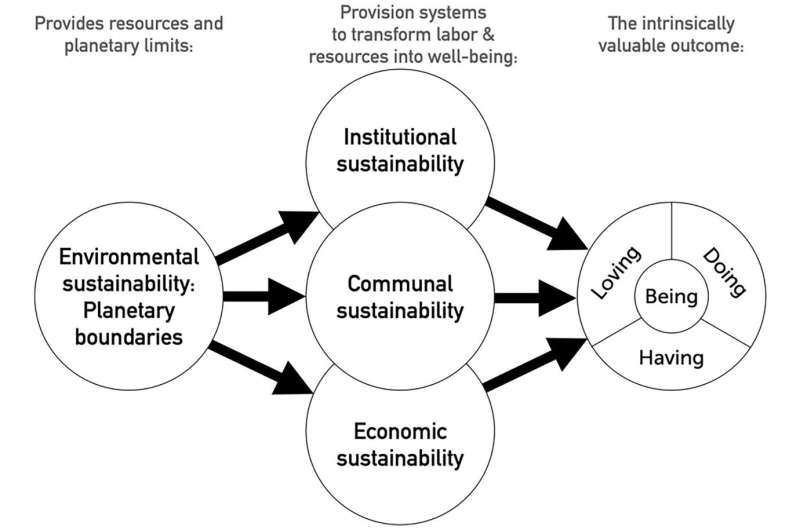This article has been reviewed according to Science X's editorial process and policies. Editors have highlighted the following attributes while ensuring the content's credibility:
fact-checked
trusted source
proofread
Finnish happiness expert seeks to shift governments' focus from GDP to well-being

Finland is the world's happiest nation for the seventh year running—but what does this really mean—and can governments legislate towards it?
"Usually when you talk about happiness and well-being, you mean the same thing. But in a scientific context, they're both quite vague. Scientists actually use more precise constructs such as life satisfaction (this is the metric where Finland tops the world) and positive feelings," says Assistant Professor Frank Martela from Finland's Aalto University. His new theory of well-being was released on 26 July in the Personality and Social Psychology Review.
Martela argues that if we can overcome the vagueness of "well-being," similarly making it into a more precise and measurable construct, we improve our chances of overturning dominant and potentially harmful economic metrics for progress.
"The economy is ultimately just a tool for transitioning natural resources and human labor into well-being. To avoid the tail wagging the dog, the focus should be on well-being indicators rather than just economic ones," Martela says.
'Having, loving and doing'
The global political fixation with GDP and economic growth not only confuses means with ends, says the Finnish researcher, but it can also be dangerously counterproductive. Economic growth is increasingly recognized as an obstacle to humanity's most pressing challenge: ensuring a habitable planet into the future.
To arrive at a better definition of well-being, we must start with understanding human nature and the basic needs that arise from it. Martela's latest paper identifies the human condition as one of 'having, loving and doing' in that we all have basic physical needs (having), social needs (loving) and needs related to agency (doing).
"We need food, water, and shelter but we also need to be accepted, have caring mutual relationships and a sense of autonomy and mastery in our activities," he says. "The crucial question for our time is how to satisfy these needs for as many people as possible globally, while doing this in an ecologically sustainable way, without transcending planetary limitations."
Governments should target cuts at areas that offer the least well-being
Sustainability is all too often presented as separate elements: ecological, economic and social sustainability. This is a mistake, says Martela, as the three components are clearly interdependent. While ecology sets the limits for all our actions, our economic and social systems have only instrumental value: They are ways of transforming environmental resources and human labor into well-being, which should be understood as the true target of government.
"If planetary limits are exceeded, current prosperity is produced in a way that threatens future generations. A sustainable economic system is one that enables future generations to prosper," he says. He acknowledges the importance of also following economic indicators. However, even in situations where governments need to make budget cuts, well-being indicators can help.
"With well-being measurements one can identify the services producing most and least well-being for money, targeting the cuts at the latter. This enables governments to make cuts that harm people's well-being the least," he says.
"Luckily, there have been some positive developments in the last fifteen years and more governments are interested in how they should be measuring well-being, and how they can implement that in the policy context," says Martela.
"If we standardize a more comprehensive measurement of well-being, we make it a more serious alternative for measuring progress."
More information: Frank Martela, Being as Having, Loving, and Doing: A Theory of Human Well-Being, Personality and Social Psychology Review (2024). DOI: 10.1177/10888683241263634
Provided by Aalto University




















